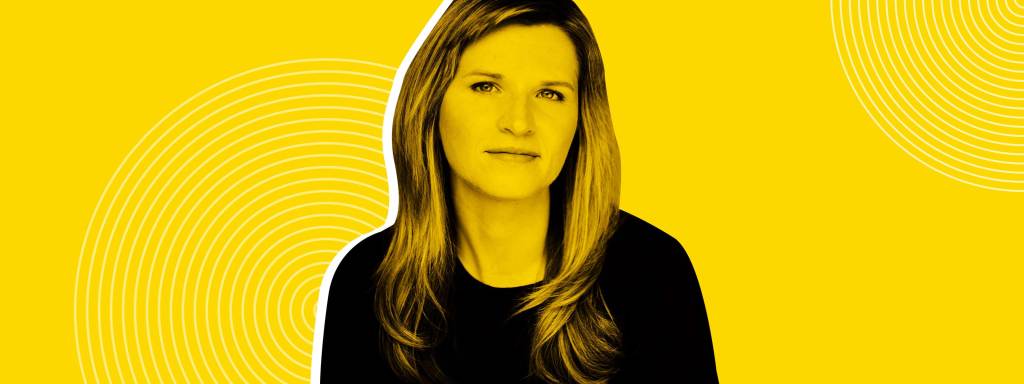
Getting proximate
Tara Westover
Tara Westover, author of Educated,explains why philanthropists need to be more proximate to the issues they care about and what that looks like. Moderated by Ford Foundation Executive Vice President of program, Hilary Pennington.
Transcript
[Getting proximate. Tara Westover, Author, “Educated”. A white woman wearing jeans and a striped blazer. Hilary Pennington, executive vice president, Ford Foundation. A white woman with short blonde hair, wearing a cream colored skirt and top.]
ANNOUNCER: Please welcome Hilary Pennington and Tara Westover.
[applause]
HILARY PENNINGTON: Let me start out with your memoir. In “Educated,” you detail your childhood growing up without a formal education. Your parents were survivalists, and while they taught you things like herbal medicine and how to survive in the wild, you had to teach yourself—
TARA WESTOVER: Skills I use every day.
HILARY PENNINGTON: … everything—every day—other students learned in school. And it wasn’t until college, at 17, when you stepped into a classroom for the first time. And your background is incredibly unique, and it’s given you perspectives that we are eager to hear more about today. If there were a thing you wish people, you know, the kinds of people in this room, could understand about people who are in parts of the country like that—rural areas, Middle America—could understand, what would it be?
TARA WESTOVER: I think that there’s something in rural culture that is very independent-minded and is—has a little bit of go-it-alone mentality. But I actually think they have that, but they’re getting it from us, as well. There’s a real sense in which I think we’ve come right to the edge of a doctrine of disconnection, which is to say that if New York is thriving and Los Angeles are thriving and San Francisco are thriving—that it doesn’t matter if everywhere else is doing badly. And I think that, it’s easy to believe that because we’re so insular and everyone we know is doing fine. And we don’t realize there’s an awful lot of parts of this country that are really, really struggling. I mean, the whole ecosystem is, is dying, and I think it’s an urban-rural thing. I think the cities are doing great under automation. The cities are doing great under globalization. The modern economy is built for the cities.
HILARY PENNINGTON: Right.
TARA WESTOVER: And we have to ask ourselves some serious questions about, what are we
going to do about the rest of the country that isn’t growing?
HILARY PENNINGTON: And what do you think?
TARA WESTOVER: I think that if we want them to believe that we’re all in it together and we’re all fighting the same fight, we have to send them that message. And right now the message we’re sending them is: “We’re doing fine. We don’t care what’s happening to you, because we’re fine.” I think you have to spend time with people who aren’t like you. That’s the ideal. I mean, New York’s kind of a lost cause for that, I feel like.
[laughter]
HILARY PENNINGTON: One of the most parochial cities in the country.
TARA WESTOVER: I find there’s different ways to be parochial, and I find New York—I think you can define parochial as less educated and less sophisticated in how many box symphonies or whatever can you—or concertos can you name. That’s one way to be sophisticated. And that’s nice. Um, but, uh, the other—I think that the other kind of parochialism is how much access do you have to people and worldviews that are different from you? And I’ve lived in New York a year. I’ve never lived anywhere that it’s harder—truly difficult—to have meaningful interactions with people who are not of your same socioeconomic group. I’ve never—there’s a meaningful sense in which I would say New York is possibly the most parochial place I’ve lived, by that other definition. That’s a whole different level of stratification, when you don’t even know anybody who doesn’t have your income and your education level. And how can you have true empathy or know what problems people are facing, or try to not talk in a condescending way, if you don’t have anyone in your life that you deeply care about who is on the other side of that divide?
HILARY PENNINGTON: Thank you. That is a challenge for the rest of the day.
TARA WESTOVER: Good luck.
[Applause.]
[New gospel of wealth. What does #GenerosityToJustice look like to you? Ford Foundation dot org forward slash new gospel.]
Accessibility Statement
- All videos produced by the Ford Foundation since 2020 include captions and downloadable transcripts. For videos where visuals require additional understanding, we offer audio-described versions.
- We are continuing to make videos produced prior to 2020 accessible.
- Videos from third-party sources (those not produced by the Ford Foundation) may not have captions, accessible transcripts, or audio descriptions.
- To improve accessibility beyond our site, we’ve created a free video accessibility WordPress plug-in.
“I think you have to spend time with people who aren’t like you. That’s the ideal.”
Tara Westover
Idea
This is what a philanthropist looks like
Shonda Rhimes, writer, producer, author, and founder of Shondaland, on using culture to create change and the importance of representation.
Idea
Emerson Collective Founder Laurene Powell Jobs discusses what brings her joy as a philanthropist.
Resource
Purchase a copy of A New Gospel of Wealth: From Generosity to Justice.